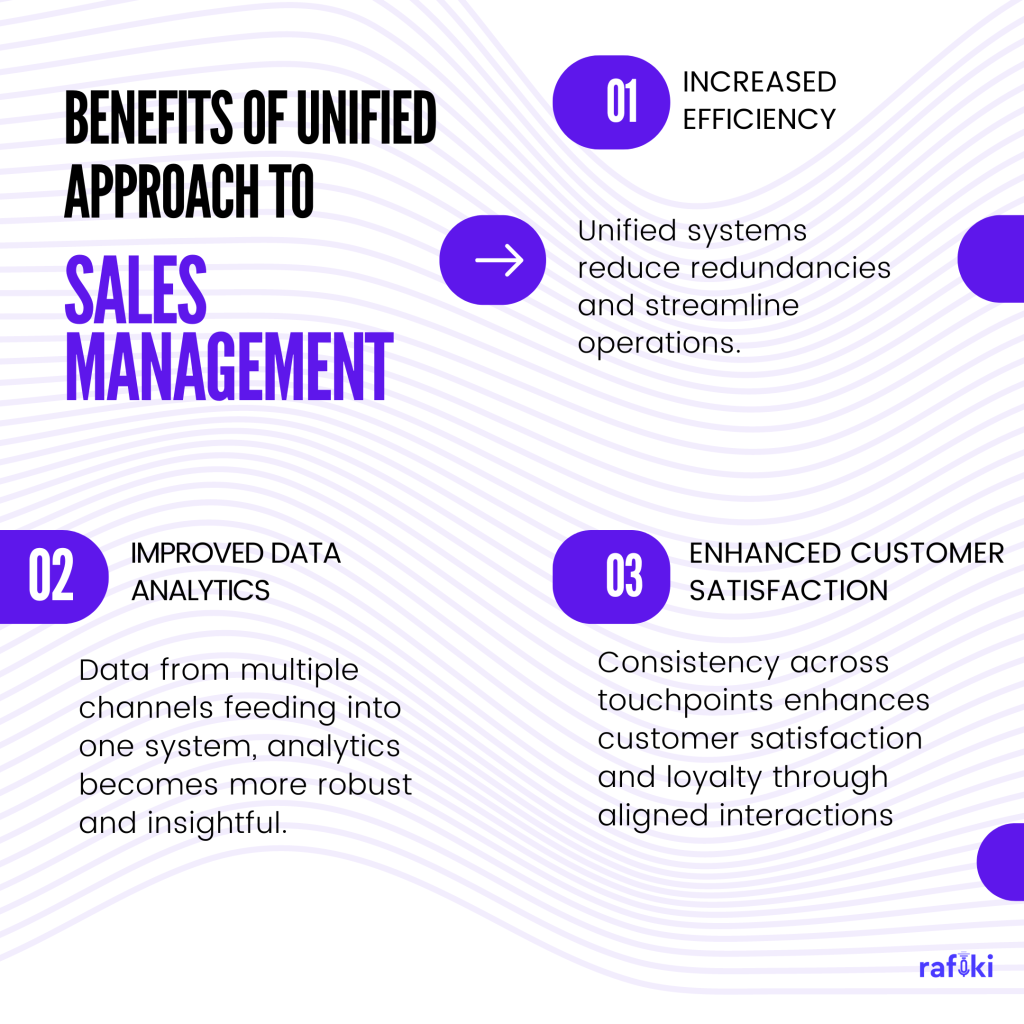Why Rafiki
Pricing


Pricing
Solutions

RevOps Leaders
Synchronize revenue generating functions

SDR Leaders
Get your team aligned and Coach your Reps 3x faster at scale

Sales Leaders
Unlock pipeline truth, drive confident forecasts

In today's rapidly evolving market, businesses are continually seeking ways to streamline operations and boost efficiency, especially within their sales departments. An effective sales cycle is the backbone of any successful business, dictating the pace at which a company grows and thrives. However, optimizing this cycle can be a challenge, fraught with complexities and ever-changing customer dynamics. According to McKinsey, top-performing B2B companies aggressively automate non-sales tasks to free up valuable time for their sales teams. This not only enhances productivity but also enables sales personnel to focus more on engaging with customers and closing deals.
This article delves into actionable strategies that can significantly improve your sales cycle, from utilizing cutting-edge automation tools to refining communication tactics and enhancing lead qualification processes. By adopting these methods, businesses can not only accelerate their sales cycle but also enhance overall customer satisfaction and increase revenue.
In the fast-paced world of sales, time is a commodity that cannot be wasted. One of the most effective ways to enhance the productivity of a sales team is by reducing the burden of non-sales activities. These tasks, though necessary, can divert attention away from the core goal of selling and engaging with clients.
Reducing non-sales tasks allows sales professionals to focus more on engaging with prospects and customers, tailoring their approaches to better meet customer needs, and ultimately closing more deals. This focus can lead to higher job satisfaction and lower burnout rates, as salespeople spend more time doing what they do best and what brings them the most reward. According to McKinsey, streamlining non-core activities and reallocating the saved time to direct sales tasks can significantly increase sales productivity, often by reducing the sales cycle length and improving the win rate.
To effectively reduce the time sales teams spend on administrative tasks, businesses can implement a variety of automation tools:
CRM Systems
Comprehensive customer relationship management systems like Salesforce or HubSpot automate data entry, lead tracking, and customer communications, creating more time for sales strategy and customer interaction.
Email Automation Tools
Platforms such as Mailchimp or Marketo can automate follow-up emails and routine communications, ensuring consistent contact without continual manual input.
Workflow Automation
Tools like Zapier or Microsoft Power Automate can streamline workflows by automating tasks across various applications, reducing the need for manual intervention in processes such as lead handoffs, report generation, and data synchronization.
By integrating these technologies into their daily routines, sales teams can drastically cut down on the manual, time-consuming tasks that often clutter their schedules. This not only frees up time for active selling but also improves data accuracy and customer relationship management through more consistent and timely follow-ups.
The key to successfully implementing these tools lies in choosing solutions that integrate seamlessly with existing systems and align with the team's specific needs. It is also critical to provide proper training and support to ensure adoption and efficient use of these technologies. As teams become more comfortable with automation tools, they can progressively automate more complex tasks, continually freeing up more time for high-value activities.
Data-driven decision-making is not just an advantage; it's a necessity for sales teams aiming to excel and outperform their competitors. Advanced analytics transforms raw data into actionable insights, allowing sales teams to prioritize their efforts and tailor strategies to meet precisely targeted customer needs.
Utilizing data-driven insights in sales enables organizations to make informed decisions that are based on trends, patterns, and factual analysis rather than intuition. This approach minimizes risks and enhances the predictability of successful outcomes. Businesses can adjust their strategies in real-time to capitalize on opportunities or mitigate potential losses.
Advanced analytics plays a crucial role in lead qualification and identifying high-value opportunities. By analyzing past interactions, customer behaviors, and market trends, analytics tools can score leads more accurately and predict which prospects are more likely to convert. This ensures that sales efforts are concentrated on the most promising leads, thereby optimizing resources and maximizing return on investment.
One exemplary tool in this field is Rafiki, a cutting-edge analytics platform designed specifically for sales teams. Rafiki analyzes audio and video from sales calls and meetings to provide real-time insights into customer interactions. By leveraging artificial intelligence, Rafiki identifies key moments in sales conversations, evaluates sales tactics, and offers actionable feedback to help sales representatives improve their performance.
Besides Rafiki, there are other robust analytics platforms that can integrate into sales workflows:
By integrating these advanced analytics tools, companies can transform their sales processes into highly efficient, data-driven operations. This not only shortens the sales cycle but also enhances the effectiveness of each customer interaction, ensuring that every step of the sales process is informed by insights and tailored to meet the evolving landscape of customer needs.
Continuous learning and development are pivotal for maintaining a competitive edge. A robust training program not only sharpens the skills of sales professionals but also adapts to the evolving market demands, ensuring that sales teams can effectively meet their targets and enhance customer relationships.
Continuous training in sales is crucial for several reasons. It helps sales professionals stay updated with the latest industry trends, understand new products and technologies, and refine their sales strategies accordingly. Regular training sessions ensure that the sales force can adapt to new challenges and changes in the market, preventing skills obsolescence and fostering a culture of continuous improvement.
Effective sales training programs provide a balanced mix of hard and soft skills:
A distinctive feature in modern sales training is the use of advanced tools like Rafiki, which enhances training effectiveness through its Smart Call Scoring system.
Rafiki analyzes sales calls in real time, providing instant feedback and scoring based on predefined criteria. This technology allows for:
Integrating tools like Rafiki with traditional training methodologies ensures that the training is not only theoretical but also practical. Sales teams can immediately apply what they've learned in simulated or real scenarios, enhancing the retention of new skills and fostering a more dynamic learning environment.
By enhancing sales training programs with a blend of hard and soft skills and leveraging innovative technologies like Rafiki for smart call scoring, companies can significantly improve the efficacy of their sales forces. This holistic approach not only boosts individual performance but also drives overall organizational success in the competitive market landscape.
Consumers interact with brands across multiple platforms and channels. From browsing products online to experiencing services in-store and engaging via social media, the modern customer journey spans several touchpoints. It is crucial for businesses to offer a consistent customer experience across all these channels to enhance satisfaction and drive sales.
A consistent customer experience is fundamental to building trust and loyalty. Disparate experiences across channels can confuse customers and dilute brand identity, ultimately impacting customer retention and conversion rates. When customers receive the same level of service and messaging online, in-store, or through direct communication, they are more likely to understand and value the brand, leading to increased engagement and sales.
Integrating online and offline sales channels allows businesses to leverage the strengths of each medium effectively. For instance, an online platform might offer extensive information and convenience, while in-store experiences can provide personal touch and immediacy. By syncing these channels, businesses can:

To achieve effective integration, businesses should:
Integrating across all sales channels is not just about technology but also about strategy and customer-centric policies. By ensuring that every touchpoint along the customer journey is seamlessly connected, businesses can enhance the overall customer experience, improve operational efficiency, and drive sales across all platforms.
Effective sales teams thrive on motivation and appropriate incentives. Understanding how to strategically motivate and incentivize your sales force is crucial for aligning their efforts with your business goals and enhancing overall performance.
Motivation is a fundamental driver of sales performance. A motivated sales team is more engaged, strives harder, and is more persistent, which directly impacts the efficiency and outcomes of their sales efforts. Motivation not only fuels the desire to achieve individual goals but also fosters a competitive yet collaborative environment that propels the entire team forward.
Incentive programs can vary widely, each designed to align with different strategic objectives:
The design of an incentive program greatly influences its effectiveness. Aligning incentive programs with business goals means ensuring that the incentives directly encourage the behaviors and results that lead to business success. For example, if the goal is to enter a new market, incentives could be designed around sales achievements in that specific market.
Strategic incentives are designed to support broader business strategies rather than just to meet sales quotas. While traditional sales quotas push for volume, strategic incentives focus on valuable actions like acquiring key accounts, enhancing customer satisfaction, or selling strategic product mixes. These incentives encourage sales teams to work smarter, not just harder, fostering a deeper understanding of business objectives and promoting more sustainable sales practices.
Throughout this discussion, we have explored several pivotal strategies designed to optimize the sales cycle and drive effective sales management. From harnessing the power of automation to reduce non-core sales activities to leveraging advanced analytics for insightful decision-making, these strategies underscore the necessity of an efficient sales process. We also delved into the importance of continuous training programs that blend hard and soft skills, and how tools like Rafiki can significantly enhance training outcomes through Smart Call Scoring.
Moreover, we highlighted the critical role of integrating sales channels to ensure a consistent customer experience, which not only enhances customer satisfaction but also fosters loyalty. Additionally, motivating and incentivizing sales teams in alignment with strategic business goals proves essential in cultivating a proactive and high-performing sales environment.
Businesses must continually evaluate and refine their sales processes to stay competitive. This involves a commitment to adapting and innovating sales strategies to meet the ever-changing market demands and customer expectations. In doing so, companies can achieve sustained growth and maintain a dynamic sales force that drives success.
Less Admin, More Selling
As the market evolves, so too should your sales strategies. Embrace these changes with open arms and a forward-thinking mindset to ensure your sales processes remain robust, responsive, and ultimately, successful.